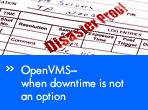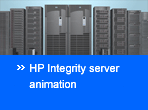HP OpenVMS Systems
OpenVMS Technical Journal V17
OpenVMS information
HP OpenVMS systems
Evolving business value
Related Links
OpenVMS Technical Journal - V17 November 2011
Welcome to V17 of the OpenVMS Technical Journal. It is indeed a great pleasure in bringing this edition of the Technical Journal to all the VMS enthusiasts around the world. We trust that you will find all the articles informative and useful.
In this version you will find many articles that will interest you, for example, an article written by Kris Clippeleyr on how to write an execlet to show a user the default device and directory specification of another process.
Additionally in this edition, you will find these articles:
- OpenVMS Time zone Troubleshooting, Sandeep Mathew
- Impact of the process quota on BACKUP performance, Shriniketan Bhagwat
- Hints and Tricks when using Directories on OpenVMS, Lokanath Bagh, P. Muralidhar Kini & Chinmay Ghosh
- A Guide to understanding the SCACP counters, SaiKrishna Manian
- Accessing RMS indexed files from non-VMS systems using SOAP and Python, Remi Jolin
- A whole re-engineering project on OpenVMS, Gerard Calliet
- OpenVMS native on x86, Arie de Groot
We would appreciate your feedback › not only on this issue but the OpenVMS Technical Journal as a whole.
If you would like to submit an article for the next issue please click here ›. Thank you for your continued support, and a big thanks to all the authors who contributed for this edition.
Editor
Table of Contents
OpenVMS Technical Journal V17
| OpenVMS Time zone Troubleshooting | Abstract › | HTML › | PDF › |
| Impact of the process quota on BACKUP performance | Abstract › | HTML › | PDF › |
| Hints and Tricks when using Directories on OpenVMS | Abstract › | HTML › | PDF › |
| A Guide to understanding the SCACP counters | Abstract › | HTML › | PDF › |
| Accessing RMS indexed files from non-VMS systems using SOAP and Python | Abstract › | HTML › | PDF › |
| A whole re-engineering project on OpenVMS | Abstract › | HTML › | PDF › |
| OpenVMS native on x86 | Abstract › | HTML › | PDF › |
| Writing an execlet | Abstract › | HTML › | PDF › |
OpenVMS Time zone Troubleshooting
Article Title: OpenVMS Time zone Troubleshooting HTML, PDF
Article Abstract: This white paper outlines the OpenVMS time zone feature that allows users to configure the timezone related settings, build timezone rules. This paper also provides troubleshooting tips and techniques on timezone related issues.
Author Bio: Sandeep Mathew started his career in HP in 2010. He has been involved on part of the Operating System (Memory Management). Currently his work area includes Utilities, such as Time Zone, MONITOR, DCL.
Impact of the process quota on BACKUP performance
Article Title: Impact of the process quota on BACKUP performance HTML, PDF
Article Abstract: This article discusses the process quotas and limits that influence the performance of BACKUP operation. This also provides guidelines calculate appropriate values for these parameters and how these could be set using SYSGEN parameters.
Authors Bio: Shriniketan Bhagwat has been working for OpenVMS from past 5+ years. He has worked on OpenVMS utilities, such as BACKUP, SYSMAN, DIF, COPY etc. He was involved in latest V8.4 enhancements. He also works on RMS and file system. He holds 3 patents published in his name.
Hints and Tricks when using Directories on OpenVMS
Article Title: Hints and Tricks when using Directories on OpenVMS - HTML, PDF
Article Abstract: A directory is a file which contains information about other files stored in. On OpenVMS, it is a sequential file with some special attributes. The attributes are 1) directory file is logically contiguous 2) record format is variable length and maximum record length is 512. It contains file names and their associated file ID (FID) along with other attributes. Content of the directory files are only data records which are called directory records. The file names are stored in alphanumerically sorted order. OpenVMS file system component XQP modifies the content of directory file on several user request viz. file create, delete, etc.. XQP has to face many challenges while modifying a directory file. The challenges are 1) Over the period of time directory file used/allocated size can grow, used size may shrink and again can grow 2) File names may arrive in any order 3) file names may be deleted in any order. While dealing with above challenges XQP may also face resources scarcity which may impact OpenVMS file system (XQP) operations.
Here are some tips and hints which will help the user to take some precautionary measure, to tune file system SYSGEN parameters, modify their application to make file system operations faster, avoid some operations, and get performance boost.
Authors Bio: : Lokanath Bagh has been working for OpenVMS for past 12+ years. He has worked on OpenVMS utilities, such as all DECset components viz. MMS, CMS, DTM, LSE, etc in the past. He presently works on RMS and its associated utility components, OpenVMS file system (XQP) and also other utilities available in OpenVMS.
P Muralidhar Kini has been working with OpenVMS since 2004. His first project in HP involved working on the Archive Backup System (ABS) product. He worked on ABS for 3 years and then moved to the VMS File system team. Currently he is working on the VMS File system components. He is specialized in the File system components; especially XFC (eXtended File Cache).
Chinmay Ghosh has been working with OpenVMS for since 1999. His past projects were RTR, ACMS, DECforms, DATATRIEVE, matured products etc. Presently he is associated with OpenVMS cluster team and volume shadowing.
A Guide to understanding the SCACP counters
Article Title: A Guide to understanding the SCACP counters - HTML, PDF
Article Abstract: Systems Communications Architecture Control Program (SCACP) is the primary utility to monitor and manage a node in an OpenVMS cluster. SCACP provides a window to peep into the current state of cluster communication between the nodes through the varied counters it makes available to the administrator. These counters are the first piece of evidence for any issues with the cluster communication. Understanding the SCACP counters may not solve the problem at hand, but might give directions on where to start searching from. This document gives useful detail on each of these counters.
Author Bio: SaiKrishna Manian joined the VMS Engineering in 2008, just after completing his bachelor's in Computer Science and Engineering. He has been working on the networking stack of OpenVMS Clusters since then.
Accessing RMS indexed files from non-VMS systems using SOAP and Python
Article Title: Accessing RMS indexed files from non-VMS systems using SOAP and Python - HTML, PDF
Article Abstract: Accessing OpenVMS RMS data from other systems is more and more necessary. This article presents a step by step example of building a SOAP server to access an indexed file using Python and the soaplib and vms.rms packages.
Author Bio: Remi Jolin holds MS in telecommunications from Telecom Bretagne(ENSTBr) in France and "playing" with VMS in various organizations for almost 30 years. SysGroup is a French consultants' company where all the staff has a deep background on VMS; has ported, maintains and supports Python and MySQL on OpenVMS.
A whole re-engineering project on OpenVMS
Article Title: A whole re-engineering project on OpenVMS HTML, PDF
Article Abstract: The customer was in an uncomfortable situation regarding their Rally applications during their Alpha/ Itanium migration. Rally is not supported by Oracle since 1993. So, it does not port to Itanium. The only sources available were printable documents related to the applications, generated as 'Report Rally' by the Rally executable. The result of our labor is roughly 1,300,000 lines of COBOL and DecForms.
Our high productivity ratio (about 1,300 lines a day created from scratch, tested, and deployed) is explained by two factors : 1) we chose the right tool kit: jRuby for Regular Expressions, xml as the knowledge repository, antlr and scala as intelligent analyzers and generators, xslt as the final code producer, Xslt, scala and perl used again as refactoring tools - all of them running on OpenVMS or linux, with a little help from DCL 2) we chose a mixed method for a mixed team : semi-automatic analysis and semi-automatic generation, new-tech. guys and old school Cobol experts working together. And the lesson to draw from all this work is: "It's possible to reuse intellectual efforts that are recorded in old code, just read it very carefully, and all will be revealed.
Author Bio: Gerard Calliet is a senior development engineer on OpenVMS since 1985. Research on new technicals at CNAM, France, in 1995. He founded a professional association for VMS: ‘provms’ in France in 2005. He is the also founded the software company, Play It Again, SOFtwarE Renew (pia-sofer), three years ago, whose goal is providing new ways for software modernizing. In roughly one thousand days Gerard’s team has managed to port twenty five huge Rally (Oracle L4G) applications, doing a 100% iso-functional rewrite in COBOL and DecForms.
OpenVMS native on x86
Article Title: OpenVMS native on x86 HTML, PDF
Article Abstract: Alpha virtualization is a good alternative to regular software migration, when you want to continue using your Alpha based software after the retirement of the Alpha system range. Unfortunately the alternatives run on Windows or sometimes a flavor of Linux, which introduces problems:
- Perceived security / reliability of the host operating system
- Version incompatibilities between virtual Alpha and host OS
- (Automatic) OS level upgrades or service packs
- User access to the host OS, jeopardizing operational security
- Ownership of the virtual Alpha now it runs on Windows / Linux
vtAlpha is a solution that installs directly on top of a x86 machine or in a Virtual Machine environment. No need to purchase, install and maintain a separate operating system. vtAlpha is developed and qualified on physical machines (HP Proliant) and can also be run on Virtual Machines.
Author Bio: Arie de Groot started his career in software engineering and moved via various assignments into the Digital OEM group where he joined the Alpha OEM group. After the spin-off of the Alpha OEM activity in 1999. Arie continued as independent entrepreneur working in the OpenVMS and Tru64 area. The most recent activity is the foundation of AVTware, a group of people to develop an Alpha virtualization product that is independent of the host environment and as reliable as the Alpha systems it replaces.
Writing an execlet
Article Title: Writing an execlet HTML, PDF
Article Abstract: How a simple question (what's the default device & directory specification of a process) can lead to some serious system programming.
This article tells the story of the development of a utility, with the necessary DCL bells and whistles, to show a user the default device and directory specification of another process. Writing this utility forced the programmer to develop a shareable image, a set of so-called user-written system services, and even a loadable executive image, aka an execlet. Several domains of the OpenVMS operating system are touched: command line parsing, help libraries, logical names, shareable images, system services, kernel mode programming, etc.
Author Bio: Kris Clippeleyr has been working in the IT industry for the best part of 30 years. He started working with OpenVMS in the mid 1980s, first as an application programmer, later on as a system programmer, and finally as a system manager. Currently working as an independent OpenVMS consultant, Kris is also visiting lecturer at Global Knowledge and at The Campus, where he conducts several OpenVMS courses (system management, programming and internals).
Other Technical Journals/Reports
OpenVMS Technical Journal V16 ›
OpenVMS Technical Journal V15 ›
OpenVMS Technical Journal V14 ›
OpenVMS Technical Journal V13 ›
OpenVMS Technical Journal V12 ›
OpenVMS Technical Journal V11 ›
OpenVMS Technical Journal V10 ›
OpenVMS Technical Journal V9 ›
OpenVMS Technical Journal V8 ›
OpenVMS Technical Journal V7 ›
OpenVMS Technical Journal V6 ›
OpenVMS Technical Journal V5 ›
OpenVMS Technical Journal V4 ›
OpenVMS Technical Journal V3 ›
OpenVMS Technical Journal V2 ›
OpenVMS Technical Journal V1 ›
HP Technical Reports ›
Archived Digital Technical Journal ›


